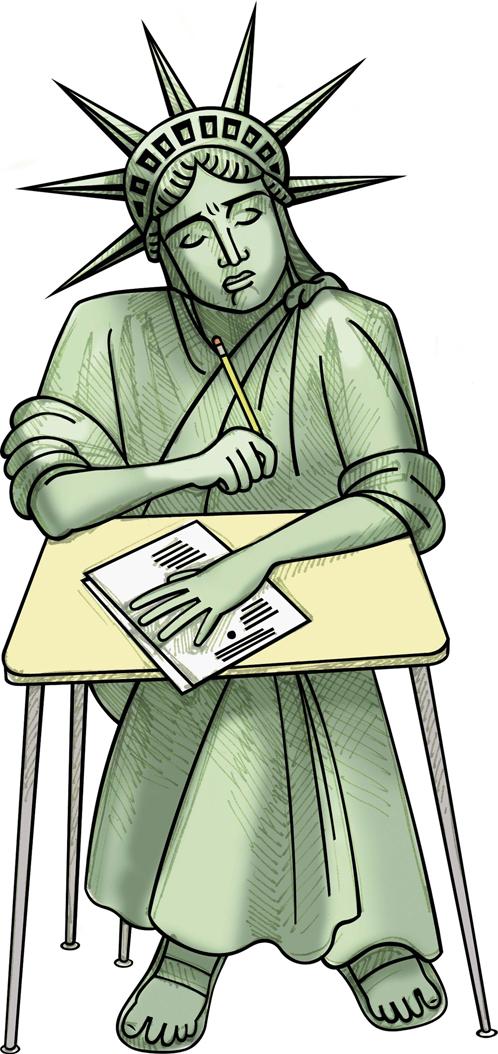Editorial: Civic education requirements need reform and funding


Amanda Raymond | TNS
Pennsylvania wants to promote civic education but apparently doesn’t want to invest the money to enforce it.
This week, State Rep. Karen Boback, R-Lackawanna/Luzerne/Wyo., and Rep. Bill Kortz, D-Allegheny, called for better civic education by introducing House Bill 1858, which would require every Pennsylvania high school student to pass a civic test in order to graduate.
The test would be identical to the civics portion of the naturalization test used by the United States Citizenship and Immigration Services. Under the bill, high school students would have to answer 60 out of the 100 test questions correctly.
The test would ask questions regarding the government, Constitution and U.S. history which immigrants are required to answer for the citizenship test.
The legislation is meant to ensure students become informed citizens and encourage civic engagement. National studies suggest high school students do not have a basic understanding of how the U.S. government works. As a result, 14 states around the country have enacted similar laws that require students to pass a civic test prior to graduation.
While having a broad understanding of our history and government is important to having an informed public, adding another standardized test to do so ismisguided in its approach.
The problem is that the legislation does not mention if there will be any extra funding to help schools enforce the new required tests. Standardized tests cost state officials and school boards time and money to administer and score. Without the proper funding to put the test in place, schools will have another expense to carry without the support to implement the tests.
And God forbid school districts with low scores get their already dismal state funding cut.
Since graduation rates among low-income students and people of color are significantly lower due to underfunded schools in low-income areas, the test would additionally add yet another hurdle to struggling schools and students without the necessary resources. The bill does not mention any added prep courses to prepare for the exam, which would disproportionately affect these groups.
If lawmakers want students to have a proper civic education, the education should focus on practical matters of government such as filing taxes, choosing health care services, applying for welfare services, understanding social security and how to navigate financial aid. Graduates undoubtedly encounter these subjects long before they’re required to know who was president during the Spanish-American War.
Furthermore, if the state truly valued civic education, it would advocate for civic education classes as a requirement in high schools, not just a test for it. Pennsylvania students are currently required to take three courses in social studies where history and government of the United States are included. Whether or not civics are involved in the class structure depends on the school.
The citizenship test asks questions about our country’s history and government branches but fails to ask questions that are relevant to being a U.S. citizen in today’s modern world. Students should understand how the government impacts their lives, and we should teach them how important political participation is to our democracy.
Our lawmakers should properly fund these new legislations if they expect schools to implement them. Instead of adding another standard test to students’ workloads, they could teach them the civic knowledge through classes first so they can successfully prepare for the test. And given the evolving nature of government, it would best serve students’ interest to understand how to apply civic education to their everyday lives.
Civic tests are great in theory, but Pennsylvania’s plan to enforce them is currently inadequate.
Recent Posts
Pitt men’s basketball navigating transfer portal difficulties
Pitt men’s basketball is like any other team in the world of large NIL deals…
Column | Pirates shouldn’t rush David Bednar back to Pittsburgh
David Bednar’s career arc has taken a turn for the worse over the last 12…
Photos: Pitt Small Jazz Ensemble
Pitt Small Jazz Ensemble performed in the Bellefield Hall Auditorium on Tuesday, April 15. [gallery…
Photos: Pitt Volleyball vs Ohio State
Pitt Volleyball defeats Ohio State University 3-0 at the Fitzgerald Field House on Saturday April…
SGB addresses concerns about ICE presence on campus, hears SJP lawsuit against administration, approves governing code bill
At its weekly meeting on Tuesday at Nordy’s Place, Student Government Board heard concerns about…
ACLU of Pennsylvania sues Pitt over SJP suspension
The ACLU of Pennsylvania filed a federal civil lawsuit against the University of Pittsburgh and…